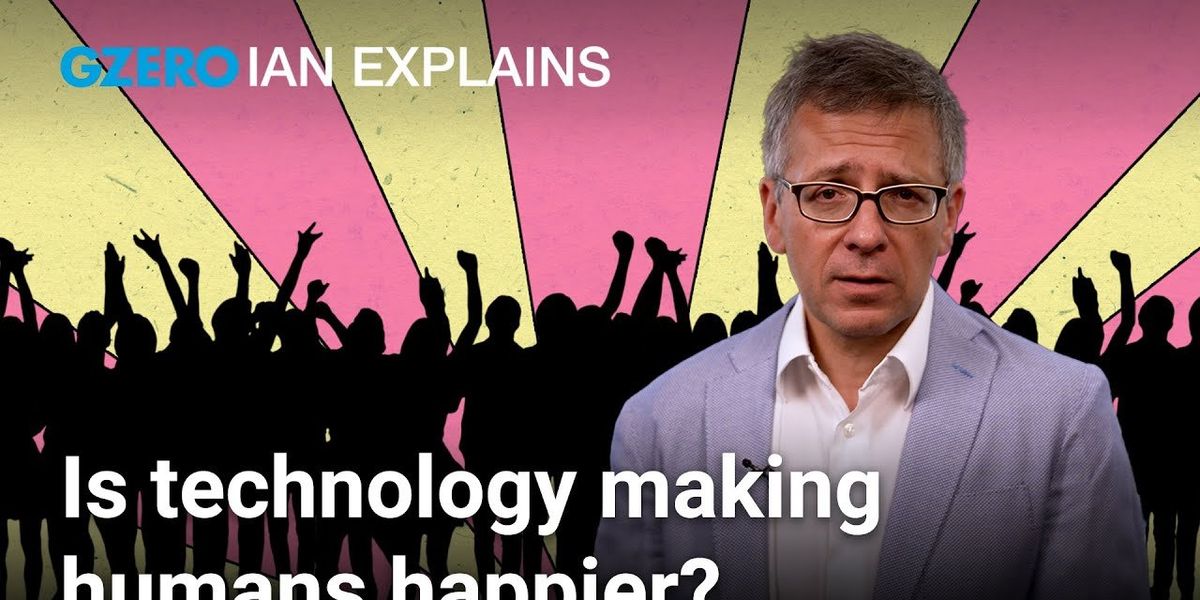Trending Now
We have updated our Privacy Policy and Terms of Use for Eurasia Group and its affiliates, including GZERO Media, to clarify the types of data we collect, how we collect it, how we use data and with whom we share data. By using our website you consent to our Terms and Conditions and Privacy Policy, including the transfer of your personal data to the United States from your country of residence, and our use of cookies described in our Cookie Policy.
{{ subpage.title }}
Ian Explains: Is the world better today thanks to human progress?
Human progress doesn’t have a finish line.
Our body clocks stop ticking at some point, but that’s not the same as reaching a destination, or achieving a goal. So how do we—as a community, as a country...as a world—define progress? What does “better” even look like?
In a word: laundry.
In 1920, the average American spent 11.5 hours a week doing laundry (and that average American was almost always a woman). By 2014, the number had dropped to 1.5 hours a week, thanks to what renowned public health scholar Hans Rosling has called QUOTE "greatest invention of the Industrial Revolution,”: the washing machine. By freeing people of washing laundry by hand, this new technology allowed parents to devote more time to educating their children, and it allowed women to cultivate a life beyond the washboard.
So, as I always say to myself whenever I’m stuck in traffic or on hold with customer service, there has never been a better time to be alive. And yet...And yet...And yet... War in Europe. Famine in Africa. Global pandemics. Fake news. Conspiracy theories. Democracy dying in the bright light of day. And that’s just your average Tuesday. So how much is technology making our lives better, and how much is a part of the problem?
Watch the GZERO World episode: Is life better than ever for the human race?
Catch GZERO World with Ian Bremmer every week at gzeromedia.com/gzeroworld and on US public television. Check local listings.
- What Ukraine's digital revolution teaches the world ›
- “Health is a human right”: How the world can make up progress lost to COVID ›
- Staving off default: How unsustainable debt is threatening human progress ›
- Is life better than ever for the human race? - GZERO Media ›
- CRISPR, AI, and cloning could transform the human race - GZERO Media ›
How booze made us...civilized
Did beer come before bread? Perhaps, says University of British Colombia professor Edward Slingerland, who credits alcohol with spurring humankind's first agricultural revolution thousands of years ago. "Our drive to get intoxicated is what caused us to create civilization," he explains, adding that booze provided a "tool for helping us to cope with all the challenges of living in civilized societies." Find out more from Slingerland about the history of alcohol in the latest episode of GZERO World.
Watch the episode: The (political) power of alcohol
How the social contract broke
Anyone who's seen an episode of "Leave it to Beaver" or "The Wonder Years" knows how the American dream is supposed to work: the white picket fence, the suburban home and the 2.5 handsome young children playing in the backyard. It's a sort of social contract, one that this country has built its identify around for the last half century. But is that dream dead? Or at the very least, far outdated? Few young people today can expect a stable career without an expensive college education and many older people are spending far more years in retirement than past generations. So what do we do when the social contract breaks down? And how do we patch up all the holes in the social safety net? London School of Economics Director Minouche Shafik shares some solutions (hint: "free money" isn't one of them).
Watch the episode: Is modern society broken?
Podcast: The LSE’s Minouche Shafik on how to fix our broken society
Listen: It was an ongoing question before the pandemic, but coronavirus has made it all the more urgent. With global inequality and extreme poverty on the rise, how do we patch up the many holes in the world's social safety nets? The idea of governments providing all adults with a set amount of cash on a regular basis, no strings attached, is gaining attention worldwide — especially given the need to expand post-pandemic social safety nets. But for London School of Economics Director Minouche Shafik, universal basic income "is like giving up on people." Shafik speaks with Ian Bremmer on the GZERO World Podcast.
Subscribe to the GZERO World Podcast on Apple Podcasts, Spotify, Stitcher, or your preferred podcast platform to receive new episodes as soon as they're published.- Podcast: US national security depends on domestic progress: Jane Harman explains - GZERO Media ›
- Podcast: Alcohol, diplomacy & society, from Edward Slingerland's perspective - GZERO Media ›
- Podcast: The COVID-damaged global economy surprised Adam Tooze - GZERO Media ›
- Podcast: Adam Grant reimagines work after COVID - GZERO Media ›
- Podcast: How human history is shaped by disaster, according to Niall Ferguson - GZERO Media ›
- Podcast: The case for global optimism with Steven Pinker - GZERO Media ›


